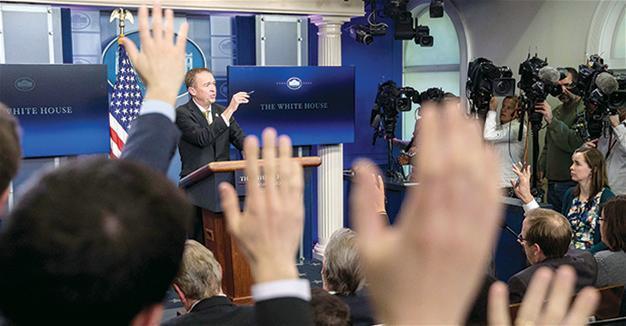Trump’s budget proposal sparks debate on steep cuts
WASHINGTON

AP photo
U.S. President Donald Trump’s budget proposal has triggered a stiff debate both in the country and in the global arena, as the Pentagon is set to become a major winner while the State Department and federal programs are in line for steep reductions.
Trump proposed scrapping dozens of agencies and programs, from public broadcasting to bioscience, to pay for $52 billion in new military spending.
He described the plan as “a budget that puts America first” – one that would help the military “win” and “set free” the dreams of Americans.
“This is a hard-power budget, it is not a soft-power budget,” said White House budget chief Mick Mulvaney, who said he trawled through Trump’s campaign speeches for inspiration, as quoted by Agence France-Presse on March 16.
“The president said, specifically, hundreds of times – you covered him – ‘I’m going to spend less money on people overseas and more money on people back home’ and that’s exactly what we’re doing with this budget,” he told reporters.
In a federal budget proposal with many losers, the Environmental Protection Agency (EPA) and State Department stand out as targets for the biggest spending reductions. Funding would disappear altogether for 19 independent bodies that count on federal money for public broadcasting, the arts and regional issues from Alaska to Appalachia.
Trump asked Congress to slash the EPA by $2.6 billion or more than 31 percent, and the State Department by more than 28 percent or $10.9 billion.
Mulvaney said the “core functions” of those agencies would be preserved. Hit hard would be foreign aid, grants to multilateral development agencies like the World Bank and climate change programs at the United Nations.
‘At expense of national security’
The Pentagon would be the major winner if Trump’s proposed spending priorities go through, with a nearly 10 percent boost for a defense budget that is already bigger than that of the next seven nations combined.
“These increases in defense come at the expense of national security,” said Republican Senator Lindsey Graham, who has not hesitated to take on Trump, as quoted by Reuters.
Republican Senator Marco Rubio, who like Graham ran unsuccessfully for president in 2016, leveled similar sentiments, as did some prominent Republicans in the House of Representatives.
Moderate Republicans expressed unease with potential cuts to popular domestic programs.
Lisa Murkowski, who chairs the Senate Energy and Natural Resources Committee, attacked plans to cut or eliminate programs that help the poor pay heating bills, provide aid for localities to deal with wastewater and subsidize air travel in rural areas like her home state of Alaska.
“We need to remember that these programs are not the primary drivers of our debt,” Murkowski said.
UN alarmed
The budget also drew criticism internationally. The French ambassador to the United Nations, Francois Delattre, warned that cutting funding for global programs could fuel instability.
An alarmed U.N. warned against “abrupt funding cuts” that would undermine its longer-term reform efforts.
Separately, Trump would earmark around $4 billion in the next two years to start building a wall along America’s border with Mexico.
Trump wants Congress to shell out $1.5 billion for the border wall with Mexico in the current fiscal year – enough for pilot projects to determine the best way to build it – and a further $2.6 billion in the 2018 fiscal year, Mulvaney said.
The estimate of the full cost of the wall will be included in the full budget, expected in mid-May, which will project spending and revenues over 10 years.
Questions over Mexico wall, infrastructure plan
Trump has vowed to make Mexico pay for the border wall, which the Mexican government has flatly said it will not do. The White House has said recently that funding would be kick-started in the United States.
Trump’s initial budget outline does not incorporate his promise to pour $1 trillion into roads, bridges, airports and other infrastructure projects. The White House has said the infrastructure plan is still to come.
The budget proposal also lacked any detail on his pledge to slash taxes and ramp up infrastructure spending, with analysts saying there is a fear that ongoing acrimony on his health policy could mean the growth-firing measures will not come as soon as hoped.
